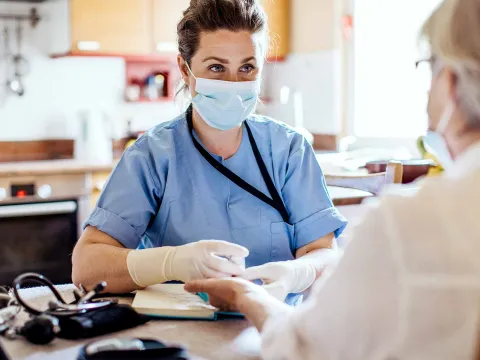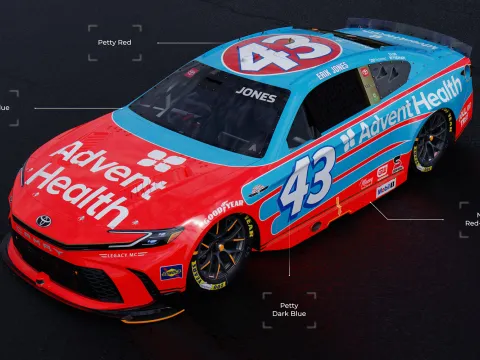- AdventHealth

Advances in device technology and minimally invasive surgical techniques are helping more people with heart valve disease and atrial fibrillation keep their hearts stronger.
Recently, you may have put off having a transcatheter aortic valve replacement (TAVR) to address heart valve disease or a device placed in your left atrial appendage to treat atrial fibrillation. However, we want to assure you that you can schedule this procedure, as our teams have taken extra measures to protect you and keep you safe.
The sooner you take action to strengthen your heart, the sooner you can take more control of your condition and get back to living your fullest life. Heart disease is serious, and is the leading cause of death in the United States, according to the CDC.
That’s why it’s so important to get in touch with your cardiologist at AdventHealth. They will consider your health history, symptoms and previous test results to help you decide when you should schedule a procedure. When you’re ready, we’re ready to care for you, safely.
We’re Taking Extra Steps to Protect You and Keep You Safe
We understand why you may have put off a procedure to have a heart device put in place. But we want you to know that safety for you and our health care team members is our priority. We have put these special measures in place to keep everyone safe.
Everyone Wears a Face Mask
You will see that our health care team members are wearing masks, gloves and other personal protective equipment (PPE) as required. In keeping with the latest guidance from the CDC, all patients and visitors at AdventHealth facilities have to wear a face mask as well. Cloth face coverings help prevent the spread of infectious respiratory viruses. If you don’t have a cloth mask, we will provide you with one before you enter.
Temperature Checks at All Facility Entrances
All patients and visitors at all entrances to our facilities must have a temperature check, just like all our team members and health care providers. People who are sick with an infectious disease usually develop a fever, according to the CDC. Screening everyone will help us identify people who are sick.
Separate Care Areas for People Who Are Sick
If someone has a fever or other concerning symptoms, we have processes in place to provide them with care in a separate area, apart from other patients.
Social Distancing Measures in Waiting Areas
We know how important it is for everyone to keep practicing social distancing. We have taken extra measures to help you stay apart from others when you visit. Look for floor markers indicating where to stand, being 6 feet apart from others. You’ll also likely see clear, protective shields at our receptionist desks.
We have also reduced the number of people permitted in waiting rooms. To help everyone remember to stay a safe distance apart, we have reorganized the seating and marked some seats as off-limits.
Remote Check Ins, at Some Locations
At some AdventHealth locations, you can wait in your vehicle, and we’ll text you when it’s time to come into the building. When you check in, you will notice that registration staff are working behind shields for everyone’s safety.
Updated Visitor Policy
At many of our locations, only one visitor is allowed per patient, which will help us reduce the number of people in our facilities and empowers us to protect and keep you safe in our care.
Cardiac Devices for Strengthening Heart Function
At AdventHealth, our interventional cardiac surgeons are experts in implanting devices that address heart defects and other life-altering heart conditions. In many cases, these devices can be placed using a catheter through an incision in an artery in your groin, arm or shoulder area.
For eligible patients, this minimally invasive technique is less risky than open surgery and also shortens recovery time and hospital stay.
Three of the most popular procedures are:
Transcatheter Aortic Valve Replacement (TAVR)
This procedure involves placing a new aortic valve inside a narrowed, defective valve to increase blood flow.
Transcatheter Mitral Valve Repair
The MitraClipTM is a small device that repairs a leaky mitral valve. The clip is attached to the valve, helping it to close better and restore normal blood flow in the heart.
Left Atrial Appendage Closure
Many people with an irregular heartbeat condition, called atrial fibrillation, must take blood thinners to reduce the risk of having a stroke. However, some can’t tolerate the medication. The WATCHMAN device fits inside and closes off the left atrial appendage, a small pouch in the top left heart chamber, to prevent blood clots from escaping.
At AdventHealth, we provide a full range of heart and vascular care services and are leaders in treating cardiovascular concerns. Some heart conditions can be managed successfully with medications and careful monitoring, but others require additional treatments. Either way, you can trust AdventHealth to help you achieve whole-person wellness, starting with your cardiac health.
We’re Ready When You Are
When it comes to your heart, you want to make sure you’re giving it the best care. We’re ready to treat your heart condition and help you get back to feeling well again. Nothing matters more to us than you. Contact your cardiologist today to schedule your visit or learn more about heart valve disease and atrial fibrillation and arrhythmias.
Our Visitor Policy may have changed since this blog/article was posted. Please click here for an updated version of our visitor policies.


